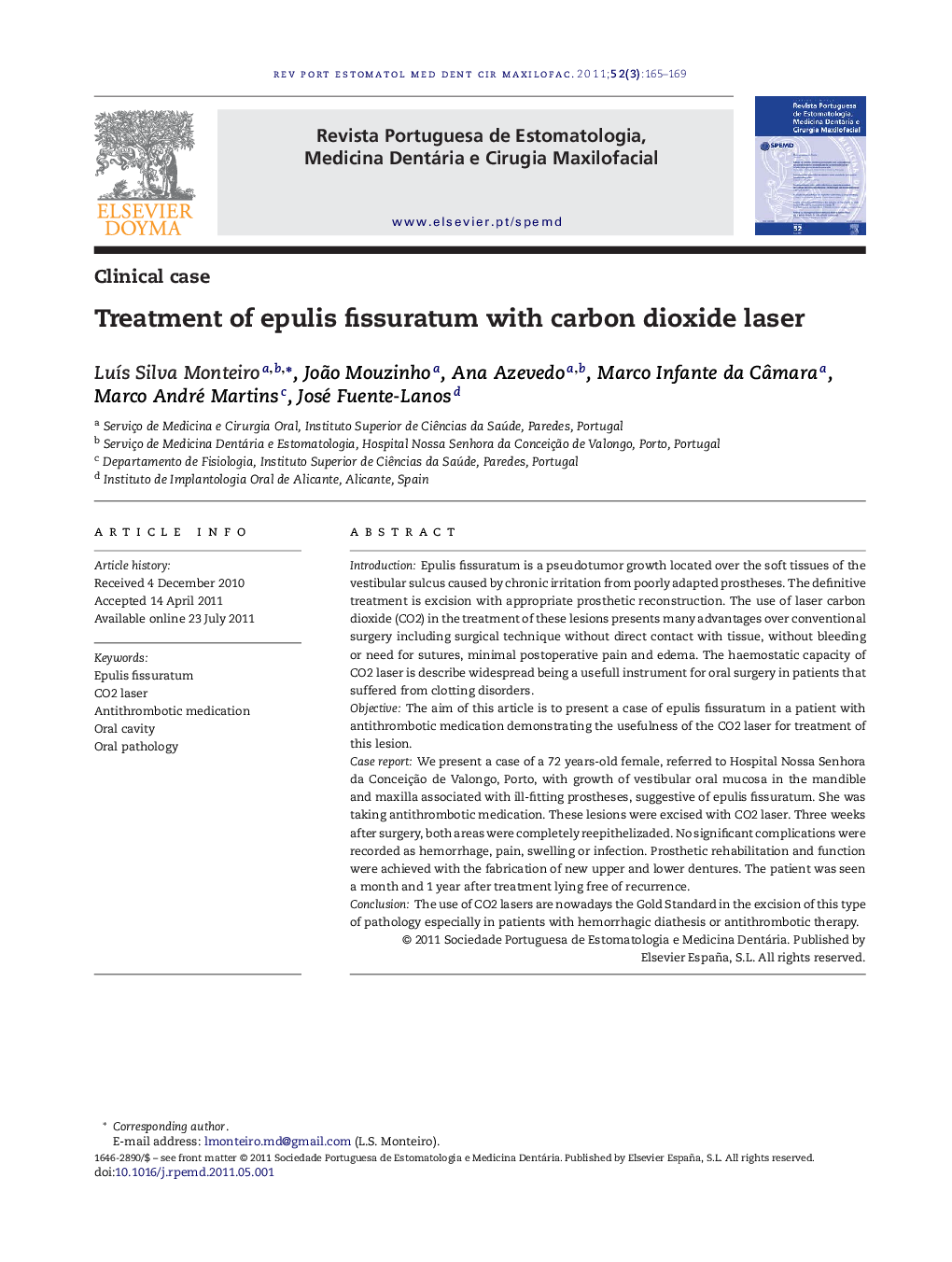| Article ID | Journal | Published Year | Pages | File Type |
|---|---|---|---|---|
| 3173830 | Revista Portuguesa de Estomatologia, Medicina Dentária e Cirurgia Maxilofacial | 2011 | 5 Pages |
IntroductionEpulis fissuratum is a pseudotumor growth located over the soft tissues of the vestibular sulcus caused by chronic irritation from poorly adapted prostheses. The definitive treatment is excision with appropriate prosthetic reconstruction. The use of laser carbon dioxide (CO2) in the treatment of these lesions presents many advantages over conventional surgery including surgical technique without direct contact with tissue, without bleeding or need for sutures, minimal postoperative pain and edema. The haemostatic capacity of CO2 laser is describe widespread being a usefull instrument for oral surgery in patients that suffered from clotting disorders.ObjectiveThe aim of this article is to present a case of epulis fissuratum in a patient with antithrombotic medication demonstrating the usefulness of the CO2 laser for treatment of this lesion.Case reportWe present a case of a 72 years-old female, referred to Hospital Nossa Senhora da Conceição de Valongo, Porto, with growth of vestibular oral mucosa in the mandible and maxilla associated with ill-fitting prostheses, suggestive of epulis fissuratum. She was taking antithrombotic medication. These lesions were excised with CO2 laser. Three weeks after surgery, both areas were completely reepithelizaded. No significant complications were recorded as hemorrhage, pain, swelling or infection. Prosthetic rehabilitation and function were achieved with the fabrication of new upper and lower dentures. The patient was seen a month and 1 year after treatment lying free of recurrence.ConclusionThe use of CO2 lasers are nowadays the Gold Standard in the excision of this type of pathology especially in patients with hemorrhagic diathesis or antithrombotic therapy.
ResumoIntroduçãoUma epulis fissuratum é um crescimento pseudotumoral localizado nos tecidos moles do sulco vestibular causado pela irritação crónica de uma prótese dentária mal adaptada. O tratamento definitivo é a sua excisão com reconstrução protética adequada. A utilização de laser de dióxido de carbono (CO2) no tratamento destas lesões apresenta muitas vantagens sobre a excisão convencional não apresentando contacto directo com os tecidos, sem sangramento ou necessidade de suturas, e com dor e edema mínimos. A capacidade hemostática do laser de CO2 está bem descrita sendo um instrumento útil em cirurgia oral em doentes com alterações da coagulação.ObjectivosO objectivo deste artigo é apresentar um caso de uma doente com epulis fissuratum que realizava medicação anti-agregante plaquetária, demonstrando a utilidade do laser de CO2 no tratamento destas lesões.Caso clínicoApresentamos um caso de uma mulher de 72 anos, enviada ao Hospital Nossa Senhora da Conceição de Valongo, Porto, com crescimento da mucosa oral vestibular na maxila e mandíbula associadas a próteses dentárias desadaptadas, compatíveis com epulis fissuratum. A doente realizava anti-agregantes plaquetários. Ambas as lesões foram excisadas com laser de CO2. Três semanas após a cirurgia, ambas as feridas operatórias encontravam-se completamente cicatrizadas. Não se verificaram complicações significativas como hemorragia, dor, edema ou infecção. A reabilitação protética foi realizada com novas próteses totais superior e inferior. A doente foi observada após um mês e um ano encontrando-se livre de recidiva.ConclusãoA utilização do laser de CO2 é hoje em dia fulcral na excisão deste tipo de patologia especialmente em doentes com diáteses hemorrágicas ou com terapias anti-trombóticas.
